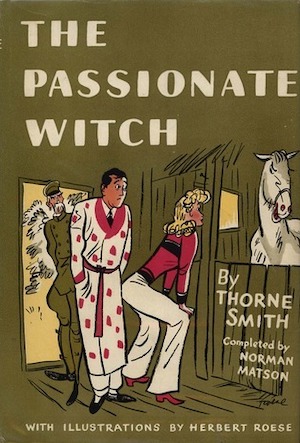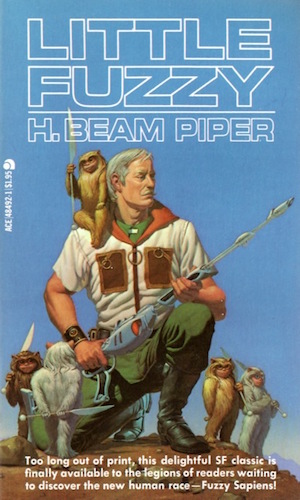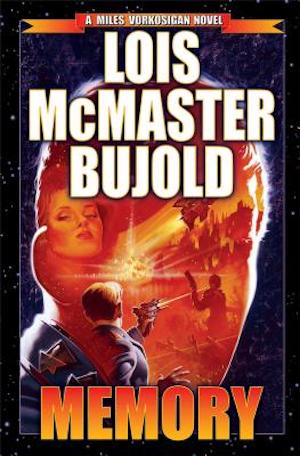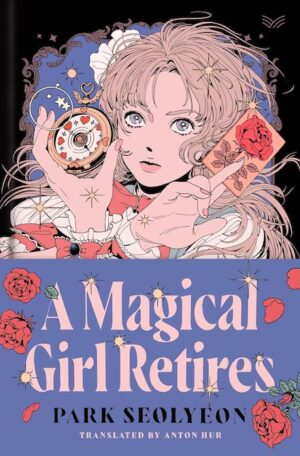There are a myriad of novels about young adventurers. No surprise, given their boundless energy, flexible lower backs, functional knees, and frequent orphan status. However, human beings are fully capable of living beyond the age of twenty-nine—sometimes they manage to cling to life even after reaching their thirties! More astonishingly, many ancients refuse to allow their manifest decrepitude stop them from pursuing activities providence clearly intended to be the exclusive province of the young. Consider, for example the libidinous display with which Tunnel in the Sky’s teen protagonist Rod found himself confronted:
Rod did so, remembered to shake hands with the Deacon. It was all right, he guessed, but—well, how old were they? Sis must be thirtyish and the Deacon… why the Deacon was old—probably past forty. It did not seem quite decent.
But he did his best to make them feel that he approved. After he thought it over he decided that if two people, with their lives behind them, wanted company in their old age, why, it was probably a good thing.
Many—well, maybe not many, but at least five—authors have embraced Rod’s open-minded reaction to his aged sister and somehow even more aged mentor’s voluptuary grappling. Don’t believe me? Here are five elderly protagonists who believed, despite all the evidence to the contrary, that active life continues past twenty-nine.
As astonishing as that may seem to some.
T. Wallace Wooly, Jr.
The Passionate Witch by Thorne Smith and Norman Matson (1941)

Boundless dynamism made widower T. Wallace Wooly, Jr. a millionaire. Alas, it was Wooly’s late father’s boundless dynamism, not Wooly’s. Middle-aged Wooly is no person’s idea of an adventurer1. Nevertheless, Wooly takes his honorary position of fire department vice-chief quite seriously. When the opportunity to rescue a naked Jennifer Broome from a burning hotel presents itself, Wooly embraces it and Jennifer as well.
The conflagratory meet-cute leads to romance, then marriage. A complication presents itself. Wooly is a steadfast, quite conventional, Episcopalian. Jennifer is a full-powered, infernal-goat-riding witch. Were this clash of cultures not awkward enough, Jennifer suspects with good reason that Wooly is all too fond of his secretary, Betty2. Fear the wrath of a jealous witch.
Thorne Smith died in 1934, which is why Matson had to finish the novel for him. For this reason, this may be the least of Smith’s comic fantasies. Nevertheless, the novel occupies an interesting role in American culture. The Passionate Witch is the basis for the 1941 film I Married a Witch, which along with 1958’s Bell, Book and Candle inspired the television show Bewitched.
Jack Holloway
Little Fuzzy by H. Beam Piper (1962)

Old Jack Holloway is considerably older than twenty-nine. How much older is hard to say, thanks to the peculiarities of superluminal travel, but nobody could deny he is the very opposite of young. Despite his advanced years, Jack works alone, prospecting for sunstones on the planet Zarathustra.
Charmed by the small, furry humanoid he encounters, Jack offers “Little Fuzzy” food and shelter. The repercussions are planetary in scale: Jack realizes Little Fuzzy isn’t a bright animal, but a person. That means that the charter for the Chartered Zarathustra Company is invalid… unless the Fuzzies are eradicated before the Federation3 learns about them.
It’s perhaps not so surprising that Company boss Victor Grego seriously considers eradicating the Fuzzies with extreme prejudice, that Jack must defend himself against a Company hired gun, or that the plot quickly transitions into a thrilling legal drama over the definition of intelligent being. What is astounding is that Grego manages to rehabilitate himself into the role of protagonist in the sequel.
Valérie Beaulieu and Hector Auvray
The Beautiful Ones by Silvia Moreno-Garcia (2017)

As a young woman, Valérie fulfilled her familial duty by rejecting her true love, charming but penniless Hector Auvray, in favor of the less charming but wealthy Gaetan. This romantic sacrifice accorded financial security to Valérie’s family.
Years later, Hector Auvray returns to the city of Loisail. Hector has parlayed his telekinetic powers into wealth and fame. Valérie is still very much out of Hector’s reach. Valérie’s naïve niece Antonina is different matter…unless Antonia’s furious aunt can somehow steer Antonia away from the dashing but socially unsuitable Hector and towards a judicious, unsatisfying marriage like Valérie’s.
You may not find yourself cheering for Valérie or Hector in this dangerous liaison. Why? Neither one is especially pleasant. The subject of this piece is older people who do interesting things, not old people who are nice.
Miles Vorkosigan
Memory by Lois McMaster Bujold (1996)

Thirty-year-old Miles has rarely met a challenge he could not circumvent through the application of sufficient determination, cunning, and fast talk. Brain damage from a recent death proves beyond even his willpower to overcome. Proud Miles tries to conceal his condition. His boss Simon rebukes and fires Miles.
Miles is at a loss how to proceed. Depressed, he considers ending it all. Then fortune smiles on Miles. Something is seriously amiss with Simon. Someone needs to determine what is wrong and what must be done. Many former activities may now be beyond Miles, but solving this mystery is not.
Nameless protagonist
A Magical Girl Retires by Park Seolyeon (2022)

Twenty-nine-years-old, an orphan, and faced with overwhelming debts, the protagonist quietly decided it would be better to die. Having selected a method of suicide that will not inconvenience people, she is saved at the last moment by Clairvoyant Magical Girl Ah Roa. The twenty-nine-year-old4 isn’t a helpless nonentity: Ah Roa asserts that the protagonist is the Magical Girl of Time, the most important Magical Girl of all, the savior of all humanity.
The twenty-nine-year-old accepts Ah Roa’s claim at face value. Alas, Ah Roa is only half correct. The twenty-nine-year-old is a magical girl. She is not the Magical Girl of Time. The actual Magical Girl of Time has no intention of saving humanity. Rather she will destroy it…unless somehow the protagonist, who knows neither what her own powers are or how to use them, can save the world.
Blame the patriarchy for superhumans being Magical Girls and not Magical People. Whatever grants powers selects powerless people in moments of dire need. In this world at this time, those are almost always women.
There must be many more middle-aged protagonists in SFF, powering through the infirmities that beset all people aged twenty-nine and above. Perhaps you know of some I didn’t mention? Feel free to tell us about them in comments below.
- T. Wallace Wooly, Jr.’s secretary Betty adores him. Why this should be is both inexplicable and unexplained.
- Wooly is smitten with Betty. Why this should be is both inexplicable and unexplained. I think the real moral of The Passionate Witch is “Jennifer could do better.”.
- The Federation in Little Fuzzy is not that Federation.
- The novel is told from the twenty-nine-year-old’s point of view. It’s only because I’m not writing from her POV that I keep having to describe her as “the twenty-nine-year-old.” I often start reviews with the protagonist’s name. Not this section, for the obvious reason. Were I to review A. Lee Martinez’s The Nameless Witch (which is not Natalie C. Parker’s The Nameless Witch), I would also have to circumlocute.











Using this space to recommend Kings of the Wyld – it’s about a mercenary band that has to come out of retirement, so I think all the main characters are around 40 or older?
I adore Kings of the Wyld, not only for it’s strong “We’re far too old for this bullshit!” energy from most of the party, but also for it’s unique AFAIK idea of treating big name adventuring parties as rock stars, whilst also not shying away at all from the truth that the adventuring lifestyle heavily trends towards brief careers and frequently very messy/unpleasant ends.
You’d have to be more than a little bit out of your mind to choose it really, but enough do to keep the numbers up some and turning over quickly.
I’m also a big fan of it’s sequel, Bloody Rose, though both it’s tone and theme are quite different from the first book. I would very happily read more books set in that world should the author decide to write more/get a publisher to produce another entry.
How about Turyin Mulaghesh in Robert Jackson Bennett’s Divine Cities trilogy?
Yes, first one I thought of as well.
“[3] The Federation in Little Fuzzy is not” what? As I see it at the moment, the footnote cuts off there.
…that Federation.”
Nor is it, thankfully, Haldeman’s Federaciòn.
Ah, I see it’s been changed then. I wish I could delete my comment.
Quite a few characters in Legacy of Heorot are older than 30, IIRC.
Horace Bury in The Gripping Hand is fairly ancient and has a very exciting life.
And in a lot of other Niven…Louis Wu, Lucas Garner for starters (not to mention Phssthpok from Protector or Jaybee Corbell from the World out of Time who are genuinely ancient in both real time and their own personal time). The Warlock and his friends tend to be…not young either.
By coincidence, I happened to read The Farthest Shore, the third book in Le Guin’s six-volume Earthsea trilogy.
Early in the novel, Arren and a boy from Roke discuss protagonist Ged:
… and then we go back to see him a decade or so later, and he’s still young enough that nobody blinks twice when he becomes a father. (Not a spoiler, given the total lack of importance of this in the plot except to his personal life.)
I love the brief description of Memory “Miles hits thirty. Thirty hits back.” One of my favourite books by LMB.
My favorite synopsis of the book is “Memory is a book about elephants.”
Elephants, what?
… oh, the sort you leave in the room? I suppose it is.
Simon tells Miles a story of diplomacy about a potential ally who had always wanted an elephant. The emperor delegated Simon to provide one. The target was delighted, and cooperative. Simon said it broadened his view of what motivated people. “Money, power, sex – and elephants.”
Of course the Lois McMaster Bujold characters that I was expecting were Cordelia Naismith and Aral Vorkosigan, from *Shards of Honor* and *Barrayar*. Or Cordelia from a later book.
It does seem to be a bit of a theme for her, he remarked with dry understatement.
For the Sharing Knife books, Dag is in his 70s.
In the Five Gods novels, Cazaril and Ista are both battered veterans in different ways. (I don’t remember *The Hallowed Hunt* to say about him.) I’m not sure you’d count Desdemona in the Penric stories: being a demon, there’s no natural end to her lifespan, er, existencespan; though her human personality imprints had in many cases been old, she herself is not heir to the aches of age.
Point of correction: Dag is 55, and to farmers he looks like he is 40 at most, even battered as he is.
Ista dy Chalion is over 40 in Paladin of Souls. Bujold has so many amazing older protagonists. As much as I love Miles I would not have picked him out of her body of work for this list.
I was expecting Cranky Ista (endearment) myself! But in keeping with the “old people, you know, in their thirties or forties” theme, I think Miles is a good example. He’s very aware that his career is over! (Heh, heh, heh.) Whereas Ista is just starting out, belike.
I sometimes suspect James specifically reserves books that would have fit–he doesn’t want to include a given book in more than one of these, so he may look at, say, The Paladin of Souls, and think that it has a lot of potential, but wants to include something by Bujold. So he looks around and lands on Miles. (To be absolutely clear, this is complete wild speculation on my part.)
An alternate explanation is what one of my preferred YouTubers does–she’ll often leave out a particularly obvious choice of examples just because it’s so obvious and doesn’t need her to point it out.
Pretty sure Ingrey is at least thirty as of the beginning of Hallowed Hunt
Everyone in the Fellowship in Fellowship of the Ring except Merry and Pippin is at least 50.
Beat me to it! The adventure kicks off the day after Frodo’s 50th birthday.
Sam is 38. Boromir is 40 or 41.
Don’t know why I put 50 there when the cutoff for “old” is 30… Typo?
The work that immediately leapt to mind for me was Remnant Population by Elizabeth Moon, with its 70-year-old (!) heroine, who is beset by aching joints but blessed with stubbornness.
Just the story I was going to mention!
Cazaril and Ista (I think she’s a grand-mother?) from Lois McMaster Bujold’s first two World of the Five Gods are certainly older protagonists! I think Ingrey from the third one is also.
Penric goes from 18 to … 40? in the novellas from the same universe.
Penric is 42 as of the most recently-published novella, Penric and the Bandit (buy it, stay up way too late reading it, I know I did: Bujold is still on my much-too-short list of buy-and-read-on-sight authors).
Cazaril is definitely not as old as he looks. This is even a plot point, with characters repeatedly being surprised at his age (35 at the start of the book, 36 at the end), because he looks, I’d guess, at least a couple of decades older. With his awful past and possibly even more awful present I’m not at all surprised.
(And then at the end he lands a job notable for aging people really fast. Will he live to see 50? We never know, because Curse is as far forward in that universe’s timeline as we have seen.)
Thirty is the cutoff, so he’s still well in theme. Ista is a little older, 37 iirc as of Curse, 40 at the beginning of Paladin of Souls.
Oh god she’s only 40? I really feel old now.
Yeah, she married young, so she’s already a grandmother at 40.
Granny Weatherwax and Nanny Ogg, in the Discworld books; they are the protagonists in Witches Abroad, as well as supporting characters in a number of the other books.
And there’s Commander Vimes of the Ankh-Morpork Watch who definitely ain’t a spring chicken (except for a time in Night Watch, of course!)
And yet, compared to the character who SPEAKS IN ALL CAPITAL LETTERS, they are but spring chicks…
Ghenghiz Cohen and the Silver Horde have had many years of not dying…
Remnant Population by Elizabeth Moon has an older-than-middle-age protagonist, Ofelia. She and her adult son are among the colonists of a world whose corporate owner is requiring them to leave. She fades into the underbrush and stays behind. It’s not the quiet end of life she’s anticipating.
the Overwhere Series by Jane Lindskold, beginning with Library of the Sapphire Wind. A group of youngsters in a distinctly non-Earth world perform a ritual to call mentors. They get three older ladies from Earth who were attending a book club meeting. This is not what the needed – or is it?
Keeper’s Six by Kate Elliott. Esther, the leader of a disbanded magical Hex, demonstrates that adventure is not just for the young when she calls her old comrades back into action to rescue her adult son, who has been kidnapped.
Was going to post about Remnant Population. I’ve reread it every decade of my life since my 20s (about to enter my 60s) and I get something new from it each time. I want to be Ofelia when I’m in my 70s/80s!
Dalinar and Navani in the Stormlight Archive by Brandon Sanderson are over 50.
SPOILERS for Warbreaker, and Brandon’s works in general:
The protagonist of Patricia Wrede’s Caught in Crystal is a retired adventurer, now innkeeper, in her 30s, with two young children.
Remnant Population was marketed as having an older female protagonist. Particularly by the author herself.
I immediately thought of Legend by David Gemmell featuring Druss, Captain of the Ax.
Waylander also immediately came to mind. AFAIR, a lot of Gemmell’s protagonists are older.
I hestitate to mention Farnam’s Freehold, but Hugh Farnham is described as “a white middle-aged man” on Wikipedia, His daughter is old enough to bear a child, though she doesn’t last much longer than that.
Giving some of Heinlein’s writing, one wonders if the daughter’s child was also her father’s child
Only if one doesn’t know the book; the Farnhams are a very conventional family until circumstances force them to be otherwise, and the book was written before RAH became obsessed with incest. (There’s a point in Karen’s labor where Hugh asks whether she was wearing shoes when the infant was conceived; given the setup that far, that’s a straight question rather than a lie-for-me stinger.)
Victoria Goddard’s The Hands of the Emperor stars Cliopher Mdang, whose career is well above thirty years old at the beginning of the book, let alone he himself. He’s probably in his sixties (there was a bit of an apocalypse and time kind of broke, so in another sense he’s over a thousand, but as far as his body is concerned, he’s around sixty).
Legends and Lattes is about an adventurer who’s aging out of wanting to spend all her time sleeping rough and getting hurt, so she opens a coffeeshop. She’s ~40, although I don’t know what an orc’s normal lifespan is.
Vlad Taltos is well past 30 by the present of his series, which has spanned almost as long in universe as it’s taken Brust to write in ourse.
Most of T Kingfisher’s books; Slate is around thirty at the beginning of The Clockwork Boys and she’s the youngest I can think of. Halla is in her forties in Swordheart (and Sarkis was too before being put in a sword), the Saints of Steel are all at least in their mid-thirties, as are their paramours.
The Bishop of the White Rat is consistently written as significantly older than any of the Paladins, though I don’t recall her age as ever being actually stated.
She certainly has that exasperated/loving attitude of ‘You damn kids!’ pointed firmly even at said Paladins, none of whom think of themselves as young any more.
I second the recommendation. Having just finished the second Saints of Steel book, in addition to being old, they complain about it constantly. I particularly laughed when one threw out his back while making love.
Sure not funny when it really happens! (not that I would know from experience…).
R. A. MacAvoy’s Tea with the Black Dragon (and it’s sequel Twisting the Rope) is a fantasy mystery romance with both main characters being older (and one actually MUCH older).
The main character of Mickey Zucker Reichert’s Renshai books is an old swordsman, though he does end up being less than mortal for reasons I won’t spoil.
Regarding Terry Pratchett: Granny Weatherwax and Nanny Ogg, certainly, but let’s not forget Cohen the Barbarian (and his Silver Horde.)
Joseph Schwartz, the protagonist of Isaac Asimov’s Pebble in the Sky, is sxity-two. This is a problem for him, as he has been inadvertently transported to a resource-strapped far-future Earth where people are euthanized at sixty.
Larry Niven’s Ringworld starts with protagonist Louis Wu celebrating his 200th birthday.
I don’t think the age of Alexis Alexander, the first-person narrator of Brian Stableford’s “Daedalus” series, is ever explicitly stated, but at the start of book one he has a college-age son, so he’s well past his twenties for certain.
And, more recently, the title character of S.A. Chakraborty’s The Adventures of Amina al-Sirafi is a retired pirate queen who has to get the band back together for one last job.
As far as Pratchett, most of the named characters are adults and Vimes, in particular, ages and complains about things he can no longer do because of it.
And Nobby is about 36 (he thinks) and Colon has adult children.
There’s some question if childbirth will be safe for Sybil as a geriatric prima parte.
Sargent Jackrum is well into their sixties.
27 comments in and nobody’s mentioned Lazarus Long yet?
Let’s also not forget Sam Vimes, Mumstrum Ridcully and Windle Poons, not to mention DEATH who is only one lifetime younger than the Universe.
I feel like [near-]immortals like Long or Death aren’t really in theme. I mentioned Vlad Taltos, who’s in his forties, but not his 500 year old friend Morrolan, because he’s of a people who routinely see two thousand years, so it doesn’t mean the same thing.
Let alone Sethra. I guess vampires or whatever-the-hell Sethra actually is are even less in scope. (IIRC from the last time I binged the whole series, we haven’t yet found out how old she is, but probably at least 250,000, which must put her right up there among the oldest characters in fiction.)
I guess that would include the Iron Druid, Atticus O’Sullivan, then, who is functionally immortal as long as he can keep drinking his special tea.
I wish I could get some of that tea.
That’s fair. And it also means that Elves are off the menu as well.
Unless you’re an Orc.
Scalzi’s Old Man’s War would seem full of old but not superannuated protagonists
Came here to mention Scalzi. He also wrote a modernized reboot of Fuzzy Nation, titled “Get Fuzzy.”
Good question, given that they have new youthful bodies.
OTOH, how old is Bill the Galactic Hero by the end of the series?
Difficult to tell (particularly as it’s almost half a century since I read the novel, which says something about my own age..), but didn’t the novel end with Bill recruiting his own younger brother, and cheerfully ignoring his mother’s protests once he realises the familial link? That would indicate he couldn’t be more than a couple of decades past his own fairly youthful (adolescent?) enlistment.
I suppose I should feel proud if I’ve remembered that correctly, but I tend to forget things my wife told me to do only two minutes ago. Mind you, I’ve been doing that since I was in my twenties,
As for the article’s “Tunnel in the Sky” reference – bear in mind that Rod is basically as thick as two short planks.
“In their ten-thousand, three hundred and ninth year of marriage, Leila and Jasim began contemplating death. […] Before dying, though, they wanted to attempt something grand and audacious.“
I instantly thought of John Aversin from Barbara Hambly’s Dragonsbane who is somewhat of a retired adventurer sought out to help deal with a dragon.
Speaking of Hambly, her Unschooled Wizard series features a big burly rough tough all-surface mercenary captain in the midst of a mid-life crisis that has profound implications for him and for his world.
Laura Kirwan’s City of Eldrich series has a female MC around 50 years old with bad knees, menopause, and a deadly saucepan. Harry Connolly’s often overlooked A Key, An Egg, An Unfortunate Remark has a female MC who is significantly older than 50 and still able to enforce the treaty she brokered.
An excellent addition to this list would be would be “The Forever Hero: Dawn for a Distant Earth, The Silent Warrior, In Endless Twilight” by L. E. Modesitt Jr.
The bureaucrat Mr. Kiku in Heinlein’s The Star Beast is of an age to contemplate retirement, but manages to overcome a significant prejudice against snakes (or people who remind him of them), while helping to save the word from devastation.
Come to think of it, The Bureaucrat in Swanwick’s Stations of the Tide is of middling years.
Marty, the septogenarian protagonist of Cory Doctorow’s latest, Red Team Blues and The Bezzle, is both an enjoyable character in his own right and an obvious attempt by Doctorow to break his streak of samey YA protagonists. Good news is, it works! It’s his best since Homeland.
David Gemmell frequently features characters who are… older than 30. Druss springs to mind, as do the cast of Winter Warriors, the Waylander novels…
Maskelle, in Martha Wells’ standalone fantasy novel Wheel of the Infinite, is in her late 40s. She has a past. She’s more mature now, but still very dangerous. It is fun to read because not much escapes her attention.
What is interesting are the story series where the author gives us a protagonist’s character arc that goes from their being a callow youth through to maturity and even old age.
Bujold depicts Miles Vorkosigan from his youth through to his being a family man.
Poul Anderson’s stories of Dominic Flandry range from his being a clever young ensign all the way to an older man at the end of his career who finally finds the love he’s been denied all his life.
Robin Hobb does this in her Fitz and Fool books. We’re introduced to Fitz when he’s born, and ends with his death. In fact, my absolute favorite books by her is when Fitz is in his middle-age and just wants to live a quiet life in the woods with his bonded wolf.
The Remarkable Retirement of Edna Fisher by E M Anderson – whats happens when you are told you’re the chosen one but you live in a rest home?
Elizabeth Moon ahd benn already mentioned, but not her Serrano Legacy series – well, first three books of it. Herris Serrano is in her forties, and her employer an later friend – Cecelia de Marktos – in her eighties. And in the third book three octogenarian ladies wreak havoc unveiling conspiracies left and right.
Claude Majewski and Madame Guderian in Julian May’s ‘The Many Coloured Land’.
Also worth noting you can pick up Little Fuzzy for free over on the Project Gutenberg website: https://www.gutenberg.org/ebooks/18137
How about two series that follow the protagonists into their senior years, The Expanse (specifically the last three) and The Longprice Quartet (specifically the last two). Actually The Dragon and the Coin can be added too. I guess Abraham likes writing older protagonists.
The Powers that Be trilogy by Anne Mccaffrey and Elizabeth Anne Scarborough. Medically discharged veteran Yana is sent to the planet Petaybee as a corporate spy to find out what the locals are hiding . Something weird and wonderful is happening and Yana decides to fight for her new home instead.
More recently Al MacBharris from the Ink and Sigil books by Kevin Hearne is a widower with a grown son who has to mediate disputes with magical creatures. He gets around his infirmities with magic writing.
Master Li Kao
James Bolivar diGriz
Louis Wu
Druss
Dakeyras / Waylander
In Except the Queen (Jane Yolen and Midori Snyder) the two protagonists were exiled from the Fairy court, and have grown old in their (now) human bodies at the point in time when the story starts.
There is Essun from the Broken Earth Trilogy- a middle aged mother of two.
Don’t forget Linus Baker, the lovable and quite pointedly 40 year old protagonist of The House in the Cerulean Sea!
One nobody’s mentioned yet: the protagonist of Adam Roberts’ Yellow Blue Tibia, who’s both at least in his 60s and notably not in the best of physical health or fitness and also finds himself stuck in a plot that calls for a Bond-style action hero, complete with ridiculous climactic setpiece fights in unlikely places.
The family of the protagonist in Leonora Carrington’s The Hearing Trumpet believes her to be quite old indeed, just because she’s a little hard of hearing and prone to going for walks without bothering to put in her teeth. They even plan to put her into a nursing home. Fortunately she has some good friends who are less narrow-minded.
Typo alert: the tag for “Throne Smith” doesn’t turn up anything other than this one article. Although he sounds like an interesting author.
Logan and Glokta in Joe Abercrombie’s First Law
Schmendrick and Molly in The Last Unicorn
Essun in N. K. Jemisin’s Broken Earth
The eponymous heroine in Sylvia Townsend Warner’s Lolly Willowes
And many of the main characters in Discworld as mentioned above
Most of the characters in The Moon is a Harsh Mistress are adults with children or grandchildren. The Adventures of Amina al-Sirafi is probably getting enough publicity, but it’s also great (pirates coming back from retirement)
Jane Lindskold’s Library of the Sapphire Wind is the first in a series of books with 4 middle aged women in a classic portal story – including flying ships and animal headed friends (and foes) and pirates and magical libraries!
4 elderly women, more than middle-aged. I’m pretty sure I recall her listing their various ages as early 70s through to 60 or so, though I haven’t had the pleasure of reading any of the series just yet, having been working my way though a 10+ book series in the meantime.
Jane Lindskold’s Child of a Rainless Year also has a middle aged protagonist–and it’s one of my favorites of hers.
The Adventures of Amina Al-Sirafi is a fantasy novel where a middle-aged pirate captain (who is also a mother) comes out of retirement for another adventure. She even complains about creaky knees.
Viv from Travis Baldree’s Legends & Lattes has just retired after 20 years of adventuring.
Lal from Peter S Beagle’s The Inkeeper’s Song is middle aged.
Stan Markowski in Justin Gustainis’s Occult Crimes Unit series is a middle aged cop with a teenage daughter.
I love coming across unexpected protagonists!
The Crimson Empire trilogy is all about a middle aged former revolutionary who faked her own death getting pulled into a new conflict when the past catches up with her. The story also heavily features her equally middle aged former comrades.
Sara Beth Durst has middle aged protagonists in The Bone Maker, and the Reluctant Queen. The Bone Maker is a campaign after the campaign story about a former adventuring party who thought they defeated their villain only to have him reemerge decades later. In the Queens of Renthia series the candidates for the throne are typically young girls, but the heroine of the middle book is a middle aged mother.
Lud In The Mist is about a middle aged father who must journey to fairyland to save his daughter.
The Dream Quest of Vellet Boe has a bad ass middle aged heroine who goes on a journey through the dreamlands with her cat.
The Dark Lord Of Derkholm was published as a children’s book but the main character is a mild mannered middle aged dad who has to pretend to be the dark lord.
In The Fifth Season, Essun is 42 and incredible powerful and dealing with big world-shaping events.
And A Matter Of Oaths is a space opera with a grumpy elderly commander who knows she’s losing her edge but doesn’t wanna quit just yet.
Woodrow Wilson Smith.
You toss in Miles Vorkosigan there, without even mentioning his just as interesting mother. Cordelia from “Shards of Honor” and “Barrayar” is very much a middle-aged protagonist, even moreso than her son.
I’m currently about halfway through book 10 of the Warhammer 40K Commissar Ciaphas Cain series, which are explained away as (highly classified) memoirs of the viewpoint character’s misadventures across his long and storied career, and he’s very definitely elderly in the chronologically final book so far. Not that the various entries progress in a linear fashion any more than the early Vorkosigan books do. I’m pretty sure the youngest we seem Cain is in at least his mid to late 20s, and he doesn’t get retired until at least 120 or so. (And then gets called out of retirement due to dire situations even then.) The life of a Hero of the Imperium is far from as quiet or pleasant as he’d prefer, but despite the harshness of his self-assessment, he really does pull off many a daring bit of heroism many times, regardless of how reluctant as he may be going in.
I know there’s at least one other novel and assorted short stories/novellas in the series as well, but I only have the 10 novels, so I shall have to leave this series aside for some time once I’m done with this entry. Alas.
40K is very much a grimdark/crapsack world, and this series isn’t interested in pulling it’s punches about that when it feels the plot requires it, but it’s also not afraid of being funny or ador(k)able at times either.
(No small part of the humour also comes via the assorted footnotes and observations by the editor and producer of the released books, especially the long-running jokes of the series.)
Roland the Gunslinger from Stephen King’s Dark Tower series.
Croaker from Glen Cook’s Black Company series. (And if we’re including the elderly and not just middle-aged, the wizards One-Eye and Goblin.)
The Water City Trilogy’s protagonist is an 80 year old man but technology is advanced enough that he’s more like 60. It’s great SF Noir.